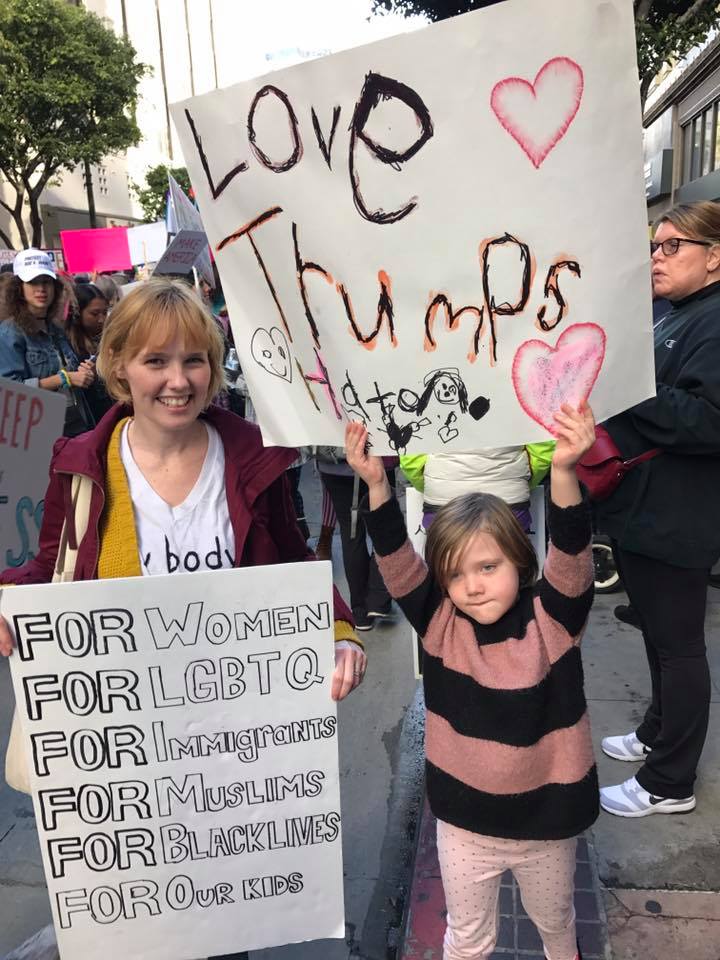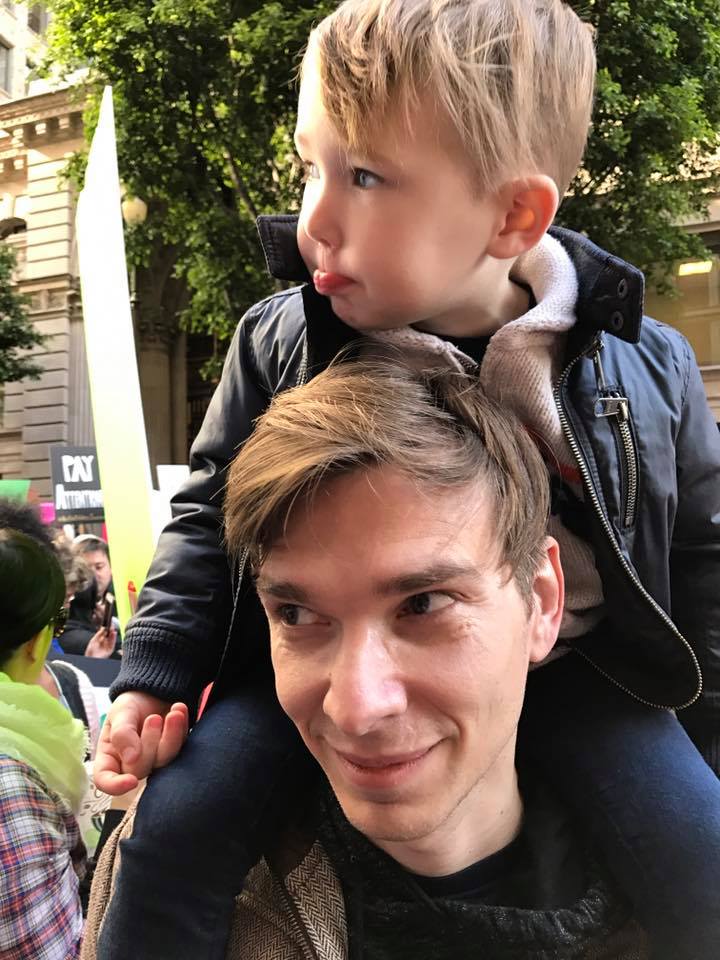It Seems We've Got Bigger Problems Now
Former President Ronald Reagan revealed his Alzheimer’s diagnosis to the nation in a handwritten letter when I was eleven. His shaky cursive was either an outward manifestation of his imminent deterioration or a sign of a man in a fragile emotional state. (Or, maybe, his penmanship was always terrible, and I had read too much into it). Free from politics, it didn’t read like a letter from a former president, but more like a sad salute from an aging man. He bid farewell to his memory of us and then turned his attention to the confusing, unexpected roadmap, which ultimately led to the end of his life.
After hearing the news, I looked to my family for how to react. Everyone wore her best look of sympathy when the topic came up at the dinner table.
“He was a good president,” Joanne said. “He was so sweet.”
I thought my family was incredibly sad, so I was sad, too. For days I felt distressed for the charismatic Ronald Reagan and his pretty wife, Nancy. I, along with 52.8% of the country, walked around with a stabbing pain in my heart and mourned the snuffing out of Reagan’s jelly-bean-loving wick.
I heard The Dead Kennedy’s for the first time when I was in ninth grade, two years after Ronald Reagan wrote that letter. Feverish and snotty from the flu that lasted two weeks, I listened to my new punk CD’s on repeat in between hallucinations. With chills, I listened to Jello Biafra persecute the seemingly sweet President Reagan in the song We’ve Got Bigger Problems Now.
I am Emperor Ronald Regan
Born again with fascist cravings
Still, you make me president
The lyrics didn’t resonate with what I believed about President Reagan. Jello Biafra likened him to Hitler and sang about how he was a warmonger. At first, I was skeptical of this portrayal, but I thought “If you can’t trust Jello Biafra, who can you trust?” I decided to examine my beliefs.
Once I dug a little deeper, I discovered a man who didn’t seem at all like the baseball-loving “Gipper” I had grown to love. I felt humiliated that I had walked around with a pain in my heart for a man who created policies that left so much of the population homeless and couldn’t even bring himself to discuss HIV/AIDS at the height of the epidemic. When I learned about his trickle-down economics and Star Wars program, I knew that we had a megalomaniac on our hands. Why had my family left out all these details when they talked about Ronald Reagan?
At that time, I had no idea what the rest of my family’s politics were, and I didn’t know if they liked Reagan as a President or just as a former actor. Beyond that afternoon when we all felt sorry for the former president, I don’t remember my family discussing the government. In a household led by two insurance agents, the only acceptable topics of conversation were shit talking and insurance. It seemed an unspoken rule that we didn’t discuss socialized health care or taxes.
When Donald Trump was elected President in 2016, I understood how people who supported progressive policies and human rights in the 1980s must have felt when Reagan was elected. So many of the lyrics in We’ve Got Bigger Problems Now are as relevant today as they were in 1981. We got ourselves a modern-day Reagan.
Since Trump won the election, Greg and I have made an effort to discuss politics in front of our kids and explain key issues to them in the hopes that we raise informed humans. We don’t talk about it in a way that will make them overwhelmed by abject terror like we are, but we do make it very clear how we feel about Donald Trump since the last thing we need is two, little Alex P Keatons (the right wing son of two hippies on Family Ties) in our family.
All the parents we know are, also, attempting to raise their kids’ awareness on social issues by speaking openly about politics and our own bewilderment with it. The day after the election, we struggled to explain why the dirty kitchen rag, who we promised wouldn’t be their president, would, in fact, be their president. We were apologetic for the world they were about to live in, but couldn’t figure out how it happened.
“If more people voted for Hailery Climpton, then why didn’t she win?” Darla asked.
“I’ve been asking that same question,” I said as I shook my head.
At a loss for what else to do, we marched. Greg and I drew signs for the Women’s March the night before and decided to let Darla make her own; we brainstormed ideas with her, but we wanted her to take complete ownership of it. We were excited to have our tiny dissident proudly carry her original slogan in the historic march.
“Mine’s gonna say ‘I love you, Donald Trump,” Darla said smiling.
“Ummmmmm, wait. What?” I asked. “Why do you want it to say that?”
“Cause I don’t want him to come after me,” she said.
Her sign was an attempt at self-preservation, and I was surprised at how adept her reading of Donald Trump was. The thought had crossed my mind that our presence at the march might lead to pain down the road if Donald Trump proved to be a real fascist. Would he use the list of people who marched against him as starting off point for arrests? I empathized with her desire to protect herself from Trump’s ire, but I couldn’t be the only parent there whose child swore fealty to the bigot at the march. Scrapping my original plan to let her do whatever she wanted, I suggested a different route.
“I like how you used the word “love,” I said. “Let’s do something with that part of it.”
In the end, we steered her toward “Love Trumps Hate” and passed it off as her idea. We had her hold her sign up high while Jude shouted “hey hey, ho ho, Donald Trump has got to go” from Greg’s shoulders.
Beyond that initial hiccup before the march, Darla has done an outstanding job of mirroring our attitudes towards Trump. Eventually, I molded her to such a degree that she began writing more disparaging comments about him in her free time. Her notes contain such gems as “Donlo Trup No Wun Cers” (Donald Trump, No One Cares). I was incredibly proud of her the day I read that.
All of her friends even mimic us parents in their daily interactions. During a playdate, the group of kids decided to play house. The two children who played the mom and dad got into a very heated discussion about Donald Trump as part of the imaginary play.
As I watch these kids imitate us parents and rail against Trump, I’ve come to realize that there is no difference between how my family discussed Reagan when I was a child and how we currently talk about Trump with our kids. Children don’t understand domestic and foreign policy; they know simple categorizations such as “nice person” and “mean person.” When I was a kid, I just wanted to know that the person taking care of all of us was a nice person.
My family might have discussed politics in front of me, but I didn’t understand it. The only thing I can remember was everyone feeling sad for the jelly bean president, which led me to put him in the “nice person” category. Darla and Jude aren’t cognizant of Trump’s Muslim Ban, border wall, the war on healthcare, tax policy that only benefits the wealthiest people, and blatant racism. Ask these kids why they don’t like Donald Trump, and you’ll probably get the response, “because he’s mean.” My kids have about as much of an understanding of politics as I did as a kid.
Eventually, the luster of our influence over Darla and Jude will grow dull, and it will be time for them to think for themselves. When they free fall into a political identity, I hope that it’s Jello Biafra and not Kid Rock who catches them. If they choose the latter, we might find ourselves at odds with one another. Maybe, in an attempt to rebel in high school, they will even assume the Republican mantle and say “I love Donald Trump” with conviction this time. I can accept a lot of choices a high schooler could make, but that isn’t one of them especially since it will be too late for me to convince them that “Love Trumps Hate.”

